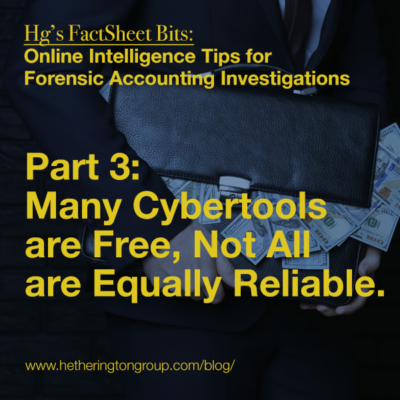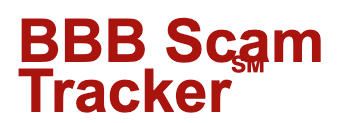 By Cynthia Hetherington
By Cynthia Hetherington
This past year I had the privilege to address The Canadian Institute of Chartered Business Valuators on the topic of online and cyber investigation applications. CBV is intensely interested in work efficiency, excellent content, and the resources that can support those endeavors. Our session was a great success and was included in the CBV Journal of Business Valuation 2020 Edition. The following is an excerpt of the session and article, in hopes of providing beneficial knowledge to information professionals, accountants, researchers and those cyber-curious truth seekers who, like CBV, value efficiency in their productivity.
This is an excerpt from Hg’s FactSheet, Online Intelligence Tips for Forensic Accounting Investigations. You can download the full report here.
Today in Forensic Accounting
In today’s data-intense, digital world we’ve all gone cyber in our endless quest for answers. Everything in the forensic accounting world, business valuations, and accounting involves data collection and fact checking. We are all invested in analyzing large datasets, finding anomalies, and extracting key information and insights.
Despite the variety of cybertools at our disposal—from optical characterization and recognition software to AI technology—an entirely different set of digital tools is proving especially useful to forensic accountants in tracking down and tracing the actions of people. The easiest to access and most readily available are open source, social media sites, search engines, and databases—some free, some not. That said, fee-based tools can hasten the investigative process, making it even more intelligent.
Following the resource tips described in this blog series will allow you to gather critical intelligence on people, historical topics, or events through public and not-so-public records without resorting to subterfuge or subverting security protocols. Understanding how these searches work—the data infrastructure or physical architecture of how information is disseminated, collected, captured, and stored—is crucial if obliged to explain your methodology to a client or testify as an expert witness in court. If uncertain about the authenticity of the information you’ve gleaned from open sources such as Facebook or Twitter, it is important that you state that clearly in a report, particularly if it serves as the basis for your analysis.
Online professional tools for forensic accountants
Although many cybertools are free, not all are equally reliable. Given the volume of data forensic accountants handle, investing in professional, fee-based digital tools can provide added levels of investigative brawn. While not a comprehensive list, below we discuss several dependable free and fee-based tools for our tradecraft.
3 Free Services
Why not save time by using one of the free tools such as Namechk, PeekYou, or Namecheckup? These three resources use artificial intelligence to auto-generate searches on your behalf. The Namechk screen capture features a color-coded legend. By plugging GreekGodGus__82 into the search box, the greyed-out sites indicate which social media platforms he’s visible on under that username. Tap on each and up will pop his profile. Frankly, this should prove sufficient for 99% of your cyber investigations. PeekYou is a Website dedicated to people search on the Internet. A bonus for investigating in here is the connection to domain names. Not all, but some, may pop up, which can be handy in an investigation.
 Zoominfo’s strength is its comprehensive database, which allows a forensic accountant to track down people in North America. There is free trial option and a subscription-based service plan. The goal of your search is to find additional company contacts or business associates to augment your investigation. Enter Zoominfo.com/people/firstname/lastname, and it will scrape all the sites it can find looking for individuals bearing the name in question. Once you retrieve those names, you are able to dig still deeper. The more data you can gather, the better. Zoominfo will capture the data and create a dossier, complete with contact information and indicate when the report was last updated.
Zoominfo’s strength is its comprehensive database, which allows a forensic accountant to track down people in North America. There is free trial option and a subscription-based service plan. The goal of your search is to find additional company contacts or business associates to augment your investigation. Enter Zoominfo.com/people/firstname/lastname, and it will scrape all the sites it can find looking for individuals bearing the name in question. Once you retrieve those names, you are able to dig still deeper. The more data you can gather, the better. Zoominfo will capture the data and create a dossier, complete with contact information and indicate when the report was last updated.
 While there are powerful paid resources such as Lexis-Nexis World Compliance or Thomson Reuter’s World-Check which offer verified sources for regulatory and compliance checks, NameScan offers some free compliance checks. Namescan is powered by Member Check Pty Ltd, an online compliance service. NameScan states they are partners with Thomson Reuters and the Australian-based Neurocom Group on their website. Their free searches include Politically Exposed Persons (PEP), Global Sanction and Office of Inspector General, and U.S. Department of Health & Human Services. Note, Namescan includes the following disclaimer, “The free PEP Check is based on a limited collection of publicly available, open source data, which has not been vetted.” Their premium paid service will run these same searches directly against the Thomson Reuters World-Check database.
While there are powerful paid resources such as Lexis-Nexis World Compliance or Thomson Reuter’s World-Check which offer verified sources for regulatory and compliance checks, NameScan offers some free compliance checks. Namescan is powered by Member Check Pty Ltd, an online compliance service. NameScan states they are partners with Thomson Reuters and the Australian-based Neurocom Group on their website. Their free searches include Politically Exposed Persons (PEP), Global Sanction and Office of Inspector General, and U.S. Department of Health & Human Services. Note, Namescan includes the following disclaimer, “The free PEP Check is based on a limited collection of publicly available, open source data, which has not been vetted.” Their premium paid service will run these same searches directly against the Thomson Reuters World-Check database.
 The Federal Financial Institutions Examination Council (FFIEC) is a warehouse of economic requirements, such as the Bank Secrecy Act and Anti-Money Laundering (BSA/AML) information. Covering U.S. agencies, this site serves as a repository of compliance laws and requirements. The BSA/AML InfoBase quickly produced the FINCEN requirements for Enhanced Due Diligence, now required of financial services clients in 2017. FINCEN’s site was a quagmire of notices and updates from 2011. You might appreciate the great organization of data that the FFIEC put into organizing its collection of data.
The Federal Financial Institutions Examination Council (FFIEC) is a warehouse of economic requirements, such as the Bank Secrecy Act and Anti-Money Laundering (BSA/AML) information. Covering U.S. agencies, this site serves as a repository of compliance laws and requirements. The BSA/AML InfoBase quickly produced the FINCEN requirements for Enhanced Due Diligence, now required of financial services clients in 2017. FINCEN’s site was a quagmire of notices and updates from 2011. You might appreciate the great organization of data that the FFIEC put into organizing its collection of data.
 The Stanford Securities Database is a clearinghouse of detailed information relating to the prosecution, defense, and settlement of federal class action securities fraud litigation. The filings database contains more than 4,000 securities class action lawsuits filed since passage of the Private Securities Litigation Reform Act of 1995.
The Stanford Securities Database is a clearinghouse of detailed information relating to the prosecution, defense, and settlement of federal class action securities fraud litigation. The filings database contains more than 4,000 securities class action lawsuits filed since passage of the Private Securities Litigation Reform Act of 1995.
 “People, Businesses, and Places” is 192.com’s tagline, and it’s definitely one of the most comprehensive online public records aggregates for conducting research in the United Kingdom. It contains almost 700 million public records and has received many top awards, including Best Online Directory site at the 118 Awards five times. The free service allows the user to conduct directory searches, local business searches, and access interactive mapping, aerial photography, and property records. At the Premium level (check the site for updated fees), you can open the door to the UK Electoral Roll (2021 is now available), making for a white-pages directory of actionable information, since British citizens need to be registered in the Electoral Roll. Records include name, age, full address, phone numbers, co-occupants, neighbors, property records, county court judgments as well as birth, death, and marriage certificates. 192.com also offers a search of the Corporations Directory, which has data on individuals who own and operate companies through the UK. On the Company Reports tab (use Advanced Business Search, found at the bottom of the Search Businesses field), view employee numbers, turnovers, financial reports and assets, listing of current and past directors, and incorporation details.
“People, Businesses, and Places” is 192.com’s tagline, and it’s definitely one of the most comprehensive online public records aggregates for conducting research in the United Kingdom. It contains almost 700 million public records and has received many top awards, including Best Online Directory site at the 118 Awards five times. The free service allows the user to conduct directory searches, local business searches, and access interactive mapping, aerial photography, and property records. At the Premium level (check the site for updated fees), you can open the door to the UK Electoral Roll (2021 is now available), making for a white-pages directory of actionable information, since British citizens need to be registered in the Electoral Roll. Records include name, age, full address, phone numbers, co-occupants, neighbors, property records, county court judgments as well as birth, death, and marriage certificates. 192.com also offers a search of the Corporations Directory, which has data on individuals who own and operate companies through the UK. On the Company Reports tab (use Advanced Business Search, found at the bottom of the Search Businesses field), view employee numbers, turnovers, financial reports and assets, listing of current and past directors, and incorporation details.
 Doing due diligence or asset location on a Canadian company? The System for Electronic Document Analysis and Retrieval (SEDAR) is the Canadian version of the U.S. based Electronic Data Gathering Analysis and Retrieval (EDGAR). It’s a free database created by the Canadian Securities Administration (CSA) to regulate trade companies and investment funds. Like the U.S., these companies are required to file their financial information. Some documents found on this free database include annual reports, financial statements, and news releases. These types of documents tend to include other information that may be valuable to your investigation, such as company addresses or names of main executives.
Doing due diligence or asset location on a Canadian company? The System for Electronic Document Analysis and Retrieval (SEDAR) is the Canadian version of the U.S. based Electronic Data Gathering Analysis and Retrieval (EDGAR). It’s a free database created by the Canadian Securities Administration (CSA) to regulate trade companies and investment funds. Like the U.S., these companies are required to file their financial information. Some documents found on this free database include annual reports, financial statements, and news releases. These types of documents tend to include other information that may be valuable to your investigation, such as company addresses or names of main executives.
 AIHITdata.com presents company information as found via a Website. It lists the updates and changes to that company information—sort of a Wayback Machine for company websites. For example, AIHIT will show the changes to a company Website as well as produce the name of the CEO of a company and when the position was changed. Search parameters include name of company, domain, registration; company description, industry; country, city, Zip code, phone, email; and client, partner, investor, person’s name, or job title. Searches can be performed on recent changes to anyone in the C-suite, contact, address, business relationship, or investor—including Any and None—over the past month or up to one year. Links to the company Websites are provided.
AIHITdata.com presents company information as found via a Website. It lists the updates and changes to that company information—sort of a Wayback Machine for company websites. For example, AIHIT will show the changes to a company Website as well as produce the name of the CEO of a company and when the position was changed. Search parameters include name of company, domain, registration; company description, industry; country, city, Zip code, phone, email; and client, partner, investor, person’s name, or job title. Searches can be performed on recent changes to anyone in the C-suite, contact, address, business relationship, or investor—including Any and None—over the past month or up to one year. Links to the company Websites are provided.
 PrivateFundData.com provides detailed information on hedge funds, private equities, and venture capital funds. A company search will provide you with contact details, a list of individuals who manage the fund, as well as individual fund data. A private fund search reveals information including assets, investor info, broker-dealers, auditors, custodians, and more. Without a membership, you’ll have limited access to the database. Full access and unlimited searches to over 30,000 private funds, over 6,000 hedge funds, private equity companies and VC firms and more than 30,000 employees/executives’ profiles is a small monthly fee. PrivateFundData could provide your missing piece of information from your background or due diligence report.
PrivateFundData.com provides detailed information on hedge funds, private equities, and venture capital funds. A company search will provide you with contact details, a list of individuals who manage the fund, as well as individual fund data. A private fund search reveals information including assets, investor info, broker-dealers, auditors, custodians, and more. Without a membership, you’ll have limited access to the database. Full access and unlimited searches to over 30,000 private funds, over 6,000 hedge funds, private equity companies and VC firms and more than 30,000 employees/executives’ profiles is a small monthly fee. PrivateFundData could provide your missing piece of information from your background or due diligence report.
 Conducting due diligence on a fraudulent company? The Better Business Bureau (BBB) is a popular resource for business reviews and complaints. Not as well-known is the BBB Scam Tracker. Search a company or keyword in the United States and Canada and you may find others who have reported the company. Scam types include advanced fee loan, fake check/money order, identity theft, and phishing. Scam reports contain the date reported and victim postal code. A victim postal code can be useful to compare with the postal code of your client to determine if the company’s victims are in the same area or are spread out.
Conducting due diligence on a fraudulent company? The Better Business Bureau (BBB) is a popular resource for business reviews and complaints. Not as well-known is the BBB Scam Tracker. Search a company or keyword in the United States and Canada and you may find others who have reported the company. Scam types include advanced fee loan, fake check/money order, identity theft, and phishing. Scam reports contain the date reported and victim postal code. A victim postal code can be useful to compare with the postal code of your client to determine if the company’s victims are in the same area or are spread out.
 Owned by Dow Jones & Company, Factiva is a business information aggregator and research tool covering the financial press in 200 countries and 28 languages. Features include media monitoring and corporate communications, advanced analytics and data mining, and competitive intelligence. Factiva received the award for “Best Business Information or Data Delivery Solution” in the 35th annual SIIA CODiE Awards.
Owned by Dow Jones & Company, Factiva is a business information aggregator and research tool covering the financial press in 200 countries and 28 languages. Features include media monitoring and corporate communications, advanced analytics and data mining, and competitive intelligence. Factiva received the award for “Best Business Information or Data Delivery Solution” in the 35th annual SIIA CODiE Awards.
 Acquired from Thomson Reuters in 2008, ProQuest was originally known as Dialog. Founded in the 1960s, Dialog was the earliest known business database and a precursor to the internet. A favorite of librarians, it’s library of 97 databases in multiple languages covering just about every industry, index, and abstract imaginable.
Acquired from Thomson Reuters in 2008, ProQuest was originally known as Dialog. Founded in the 1960s, Dialog was the earliest known business database and a precursor to the internet. A favorite of librarians, it’s library of 97 databases in multiple languages covering just about every industry, index, and abstract imaginable.
 A market driver in the development of electronic access to legal and business research, LexisNexis provides access to more than five billion documents and records from over 35,000 sources of local and international news and business information.
A market driver in the development of electronic access to legal and business research, LexisNexis provides access to more than five billion documents and records from over 35,000 sources of local and international news and business information.
 Like the Google alerts of business information, BizNar is a free-to- use professional resource. It mines the deep web, reaching into special, often unique collections that wouldn’t normally be top of mind or otherwise easily found using traditional search engines. Created by a company out of New Mexico, it allows you to roll back your search to a specific time and see only articles pertaining to your subject. It also facilitates visual data mapping for those who prefer to work in pictures.
Like the Google alerts of business information, BizNar is a free-to- use professional resource. It mines the deep web, reaching into special, often unique collections that wouldn’t normally be top of mind or otherwise easily found using traditional search engines. Created by a company out of New Mexico, it allows you to roll back your search to a specific time and see only articles pertaining to your subject. It also facilitates visual data mapping for those who prefer to work in pictures.

Hg OSINT TRAINING OPPORTUNITY: Open Source Intelligence—Start to Finish, an OSMOSIS Primer Webinar Series, 360 minutes, 6 CEUs
Designed as an online investigation’s primer, this series provides the basics of open source intelligence gathering to those entering the field. With three days of content, the field investigator will complete the 360 minutes of training with the tools needed to conduct open source intelligence investigations.
 RISK ASSESSMENT
RISK ASSESSMENT
Are you concerned about your company’s or employees’ points of vulnerability through online and open sources? Our skilled analysts are experts at removing personal information that puts you, your business partners, and your family at risk. Learn how our team can assist you in assessing and monitoring your risks.
 Cynthia Hetherington, MLS, MSM, CFE, CII is the founder and president of Hetherington Group, a consulting, publishing, and training firm that leads in due diligence, corporate intelligence, and cyber investigations by keeping pace with the latest security threats and assessments. She has authored three books on how to conduct investigations, is the publisher of the newsletter, Data2know: Internet and Online Intelligence, and annually trains thousands of investigators, security professionals, attorneys, accountants, auditors, military intelligence professionals, and federal, state, and local agencies on best practices in the public and private sectors.
Cynthia Hetherington, MLS, MSM, CFE, CII is the founder and president of Hetherington Group, a consulting, publishing, and training firm that leads in due diligence, corporate intelligence, and cyber investigations by keeping pace with the latest security threats and assessments. She has authored three books on how to conduct investigations, is the publisher of the newsletter, Data2know: Internet and Online Intelligence, and annually trains thousands of investigators, security professionals, attorneys, accountants, auditors, military intelligence professionals, and federal, state, and local agencies on best practices in the public and private sectors.



